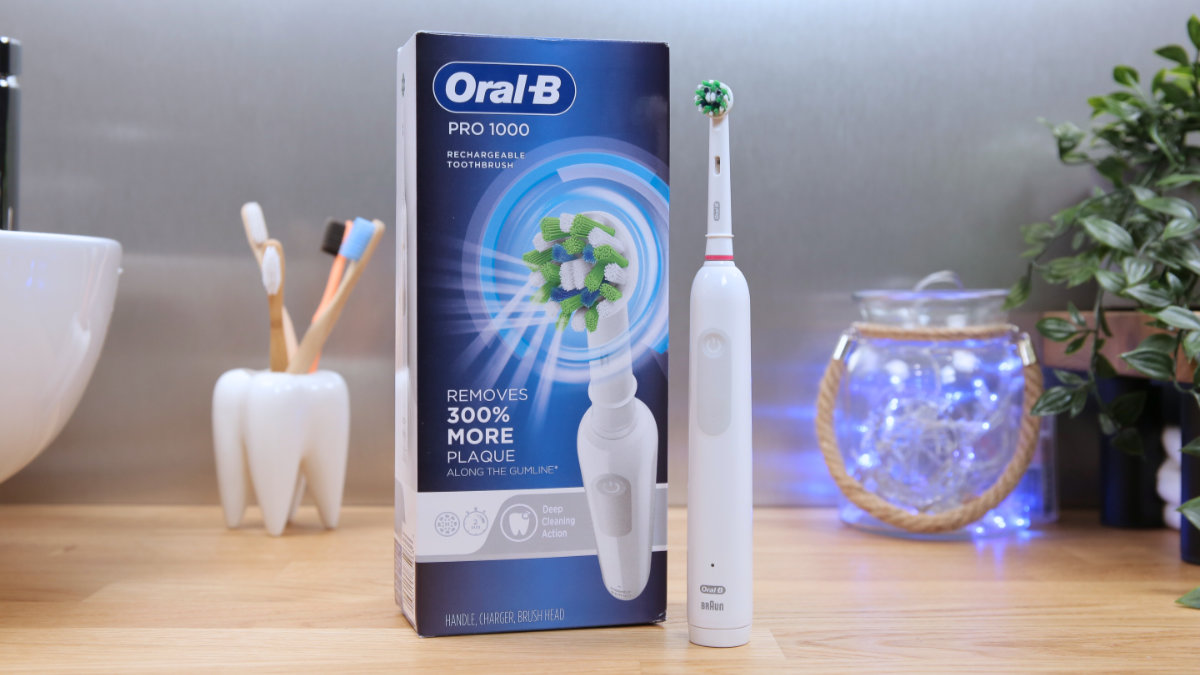
What the cleaning experience is like and how clean our teeth felt after brushing.
How well it cleans Score SummaryWhat the brush is like in-hand; how grippy it is, what the balance is like, how easy it is to remove brush heads.
How it feels Score SummaryDoes the brush have our recommended features of a timer, pacer & pressure sensor and how well do they perform?
Recommended features Score SummaryHow easy is it to clean the brush, how noisy is it, does it come with a travel case or any other useful items?
Additional items & features Score SummaryHow long does the battery last, how long does it take to charge and does the brush have a battery level indicator?
Battery performance Score SummaryWhat are the total ownership costs over the space of several years and how expensive are replacement brush heads?
Price Score SummaryHow long is the warranty, what is the manufacturer's reputation and how strong are its environmental efforts?
Support & reputation Score SummaryApplies to smart toothbrushes only. How well does the smart technology work and how useful is the app?
Smart features Score SummaryOur verdict
The Oral-B Pro 1000 is a good electric toothbrush that can clean your teeth very well despite only having basic features.
It would be better if it had a visible pressure sensor and a longer battery life. If you can afford to, we do recommend opting for the Smart 1500 instead so that you get a visible pressure sensor.

Pros |
Cons |
|---|---|

Multiple cleaning modes |
No visible pressure sensor |

Minimal design – Easy to keep clean |
10 day battery life |
Consider the Smart 1500 if you can afford to spend a little more
If you can afford to spend a little bit more, the Oral-B Smart 1500 is our current recommendation for the best electric toothbrush.
Similar to the Pro 1000, the 1500 has a better battery life and a visible pressure sensor that will alert you when brushing too hard.

How well it cleans
You may be surprised to see a brush at this price has scored full marks in our 'how well it cleans' category, but the truth is it cleaned my teeth just as well as more expensive models.
The small round brush head produces good cleaning results
The size of Oral-B’s round brush head is something many users come to really like. Smaller than most, it is able to reach tighter spaces in the mouth and gives a satisfying clean. It can feel more intense and almost aggressive compared to the softer brushing sensation you might get with the likes of a Philips Sonicare toothbrush.
The Pro 1000 is the cheapest model in the Oral-B range to have a 3D cleaning motion rather than 2D. This means that in addition to the oscillating and rotating action, there are mico pulsations, which add a 3rd dimension to the cleaning effect for better results.
If your toothbrush of choice is currently a manual brush you will really see and feel the difference should you switch.
The Pro 1000 will typically come supplied with the CrossAction head. It is one of a number of different brush head styles that are compatible with the handle. You can choose and fit the style of head you prefer, but my recommendation is the soft bristled Pro GumCare or the slightly firmer bristled CrossAction head. Don’t worry too much though, they all do a good job.
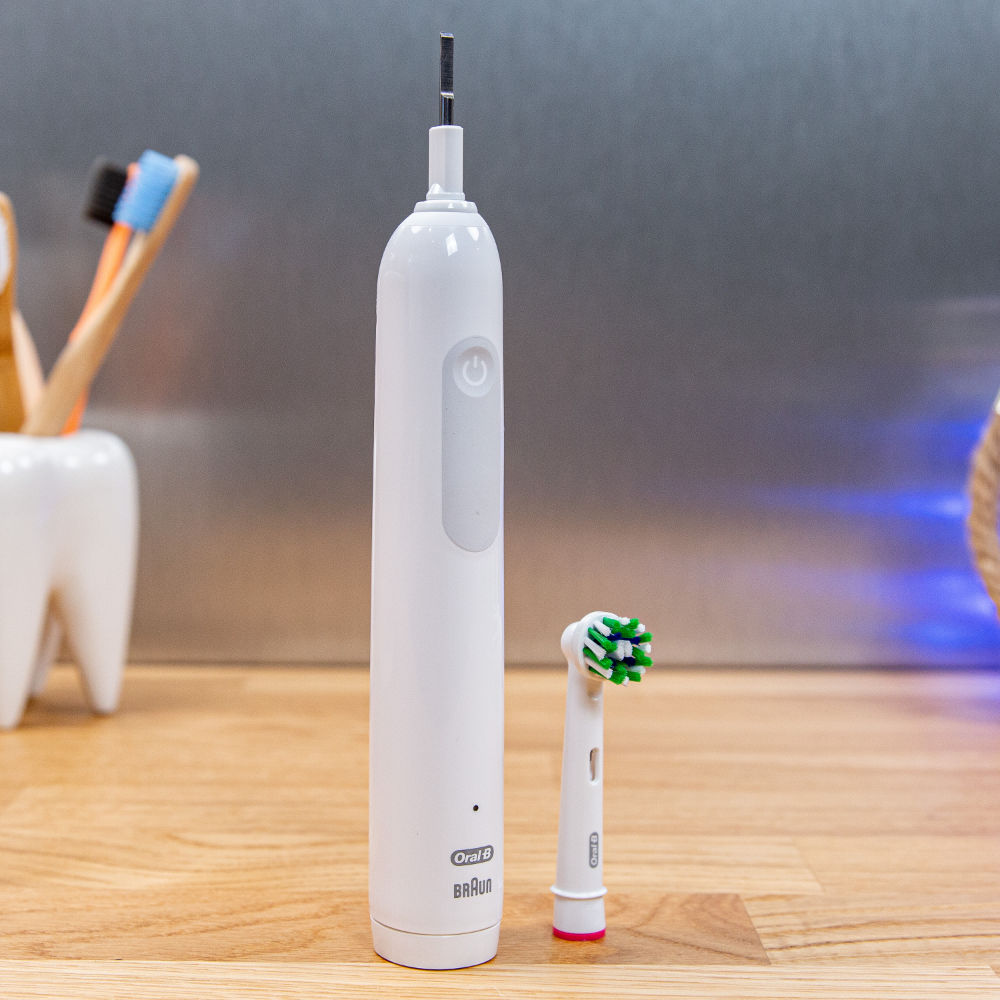
How it feels
Overall the Pro 1000 is a comfortable brush to use. Its design isn't quite as slick as Oral-B's newer iO range, but it makes up for this by being a cheaper brush to own.
Not grippy, but not slippy
The Pro 1000 handle is primarily made of plastic and doesn't have the rubber grips that are found on some other Oral B models. Whilst this means it's not quite as grippy, it does come with the upshot of the brush being easier to keep clean.
And that's not to say that it's a slippery brush. It isn't. I have found that other Oral B brushes — like those with rubber grips or a textured finish — do have slightly better grip, but I've never felt like the Pro 1000 is about to slip out my hand.
Models like the Vitality have large rubber grips that do make the brush feel a little more secure to hold, but consequently have more places for dirt to build up and make it much harder to clean.
The back of the handle does have a series of small dimples, which do provide a bit of additional grip to the fingertip. They are quite subtle and run the length of the handle. There is also a panel of rubber around the power button that adds a little texture.

The rounded handle isn’t a perfect cylinder, it is a touch thicker than it is wide, but it stands upright on a worktop. It also doesn’t roll when laid flat due to 2 perfectly placed nodules.
Available in white, black, blue and pink, there is more of a gloss finish to the plastic which I think makes the Pro 1000 look a little less refined than those with a matt finish.
A firm yet responsive power button
Power buttons are not a feature that need a great deal of scrutiny, but there is a degree of variance to them. Some are easy to push by accident, others are a little on the stiff side.
I found the Pro 1000's power button firm, yet responsive. The brush always defaults to Daily Clean mode, so if you want to change to a different mode you will need to press the power button multiple times each time you use it. This really isn't a problem unless you suffer from severe joint pain and really struggle to press a button.
Additionally, the brush heads are easy to attach and detach. I have found it's best to remove them regularly so that both brush handle and head can be rinsed. This helps to avoid the build up of grime and bacteria.

Recommended features
The electric toothbrush features we recommend as essential are a timer, pacer and pressure sensor. The Pro 1000 scores fairly well here because it does include all three of these, although the pressure sensor implementation does leave something to be desired. The timer and pacer are simple features that work as expected.
It's easy to miss or ignore the pressure sensor alert
A pressure sensor is one of the features our in-house dentists recommend is present in a good electric toothbrush. This is because many people have a tendency to scrub their teeth and brush with more force than is necessary. Doing so will damage the teeth and gums over the long term and isn’t as effective at cleaning the teeth in the short term either.
Oral-B has for many years built pressure sensors into their toothbrushes and the Pro 1 is no exception, but the configuration here isn’t optimum.
Unlike other Oral-B brushes, the pressure sensor is not visible on the handle. Nor is it audible. This means that if you apply too much pressure as you brush, you don’t know about it. Technically the sound and brushing sensation do change when the sensor is active, but you have to be paying close attention to notice — I found it easy to miss or ignore.
When too much pressure is applied, the 1000 will automatically reduce the number of bristle movements to limit potential damage. But if you don’t know whether the sensor is active or not you can’t learn when you are brushing with too much force and make the necessary improvements.
The Smart 1500 on the other hand has a visible sensor that notifies you when it is activated. This helps you to learn and adjust your technique accordingly.
The lack of a visible pressure sensor isn’t a reason to avoid the Pro 1000 but should be something to think about as you consider your options.
By way of another example, the Philips Sonicare 3100 doesn't have a visible sensor, but the handle will vibrate when you brush too hard.
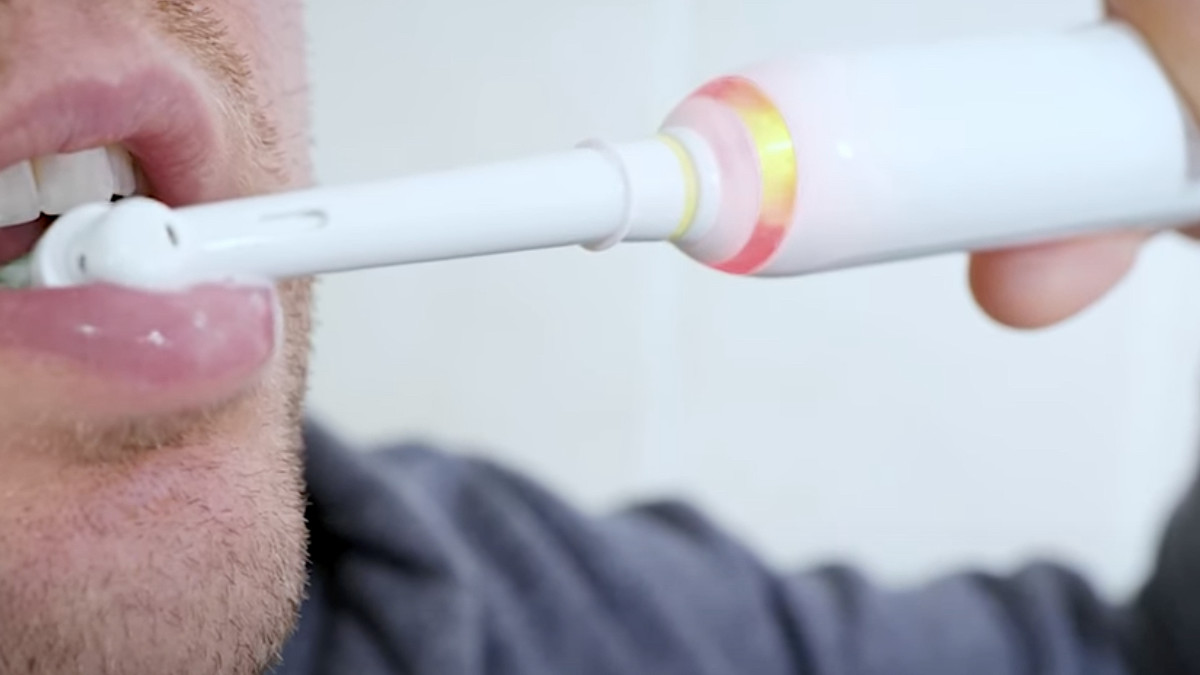
The timer and pacer help you brush your teeth evenly
It’s all well and good brushing your teeth, but if you don’t give them equal attention, your oral health will suffer. You need to brush the front, back and biting surfaces of all the teeth, not just the ones you show as you smile.
The pacer helps achieve this. It momentarily pauses the brushing action every 30 seconds to tell you to move on to the next part of the mouth. After 2 minutes the alert changes slightly to tell you that you have brushed for long enough.
Unlike some brushes, the Pro 1000 doesn’t power off automatically. This may be a disappointment to some, but it’s not a big issue.
Additional items & features
Being an entry-level brush, the Pro 1000 doesn't come with extras like more expensive brushes, and this means it has a low score in this category as a result. That's not a reason to disregard it though; if you need a straightforward brush that gets the job done without costing much, it's a very good choice. In the following sections we comment on noise, how easy it is to keep clean and the cleaning modes it has available. Whilst these aren't critical features, they are still useful to consider.
It’s easier to keep clean than the more affordable alternatives
In daily use, saliva, toothpaste and debris from your mouth will inevitably come into contact with the Pro 1000 brush handle.
This isn’t a problem though, because as a primarily plastic handle, I've found it really easy to keep clean. A rinse under the tap or shower gets rid of most buildup, whilst a little wipe with a cloth will help remove more stubborn grime.
The Pro 1000 doesn't have rubber grips like some other Oral-B models, which is one less place for grime to build up. It's also easier to keep clean that Oral-B's new iO models. If you know you're unlikely to clean your brush that often, there is something to be said for having a brush that's as easy to keep clean as the Pro 1000.
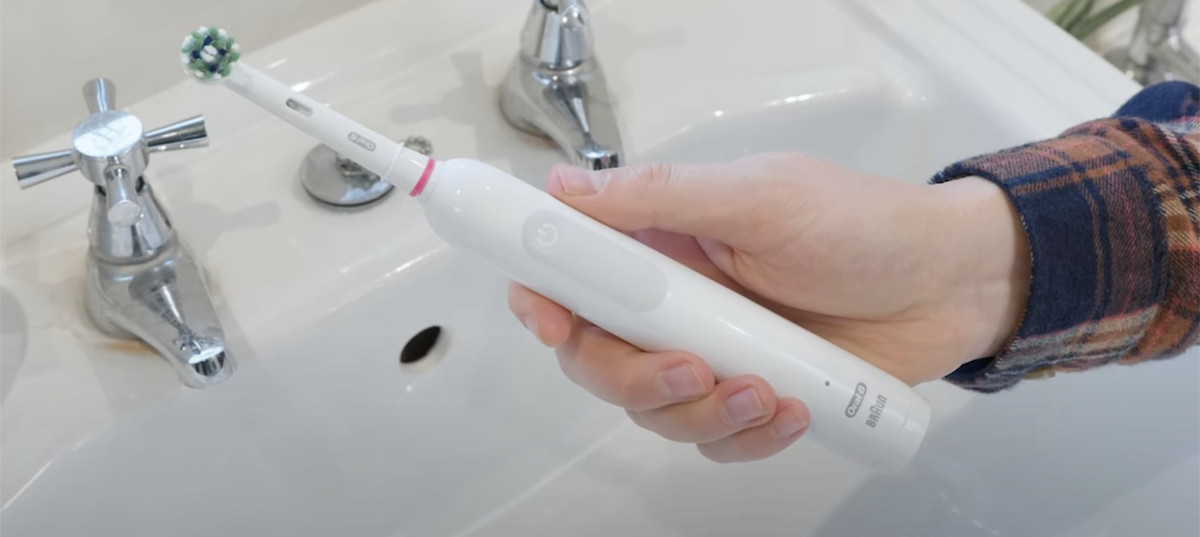
It won’t tell you which of the 3 modes you have selected
The updated version of the Pro 1000 comes with three different cleaning modes: Daily Clean, Sensitive and Whitening. Previous iterations only came with Daily Clean.
Daily Clean is my preference and the one I recommend most people use.
Sensitive is great for those who want to enjoy a less intense cleaning action, or for those days your teeth or gums might feel a little more tender. It pairs well with the softer bristled Pro GumCare head. In fact, if you are a new electric brush user, you might like to begin using the Pro 1000 with this mode to ease yourself into the additional power on offer.
To me it feels like the whitening mode isn't much different. Yes, it uses the power of the brush motor differently, but truth be told the cleaning results over all 3 modes are comparable if you master your brushing technique. Don’t think you are going to use whitening mode and any dull yellow teeth will shine like a diamond within a few days. At best it’s going to lift some external stains on the tooth surface, but any mode can do this.
Irrespective of your preference, the Pro 1000 always defaults to Daily Clean. You can switch between modes by pressing the power button on the front of the handle. For example, you would press 3 times if you want whitening mode.
As there are no icons, LEDs or labels on the handle, you don’t get the confirmation you might desire that you have selected the appropriate mode. You have to learn the order (as above) and trust yourself. In time you will learn the difference between each mode based on the sound and sensation.
Whilst competing brushes often have icons, you have to spend a considerable amount more within the Oral-B range of brushes to get such. It’s just the way they have designed their handles. It's not worth splashing out on if you're on a budget.
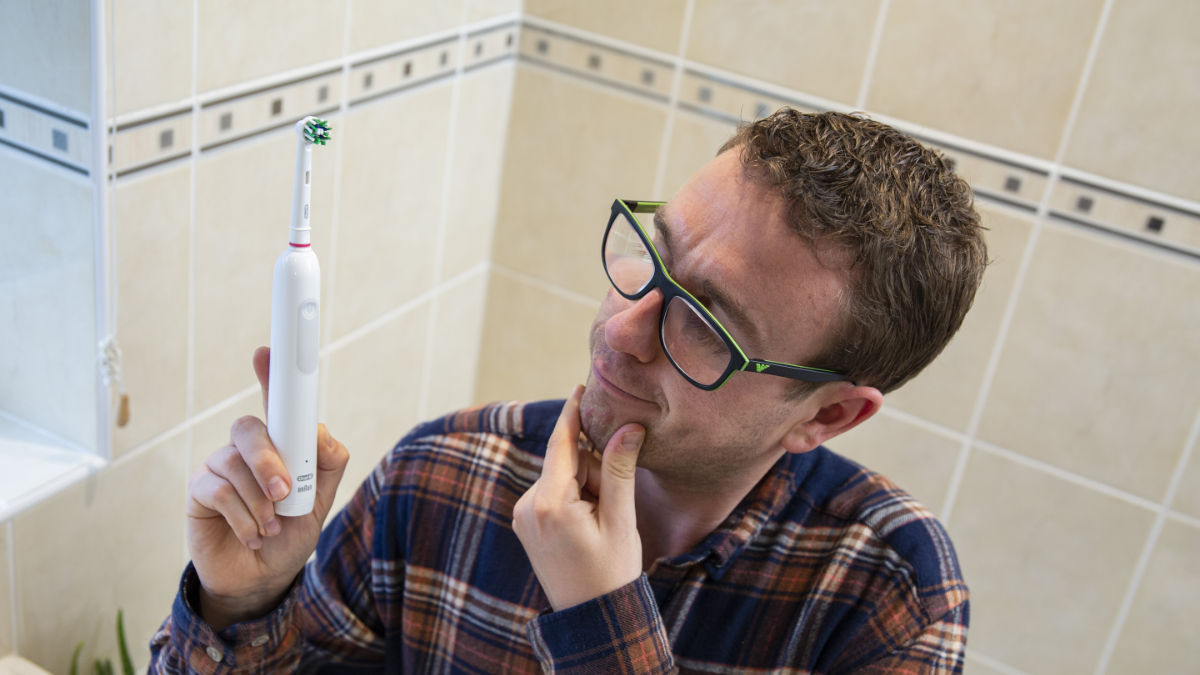
It’s louder than expected
The Pro 1000, like the majority of Oral-B brushes, makes a fair bit of noise. It is far from silent when in use.
We registered 75 decibels on our noise level meter.
It isn’t a deal breaker by any means, but it does produce a louder and more mechanical sound than the humming noise that a quiet sonic toothbrush makes. Most sonic toothbrushes register at 60-70dB.
If someone tried talking to you whilst you were brushing your teeth it would be more difficult to hear them clearly when using the 1000.
The iO Series 3 is one of the quietest Oral-B brushes at 64 decibels, but something like SURI’s toothbrush is another 10 decibels quieter still at 54dB.
|
Oral-B Pro 1000
|
|
Oral-B iO Series 3 (iO3)
|
|
Oral-B Pro 500
|
|
SURI S1 Toothbrush
|
Battery performance
During my testing, the Pro 1000's Nickel Metal Hydride (NiMH) battery lasted 10 days from a full charge. This is on the low side compared to other brushes, but again it isn't a deal-breaker if you're on a budget.
Most Oral-B brushes last 14 days when charged. The iO2, which is a slightly more expensive budget offering from Oral-B, lasts an impressive 37 days. The vast majority of electric brushes from other brands offer in the region of 3-4 weeks of use on a single charge. Many even last far longer.
Few of us actually need our brush to last all that long. It’s unlikely to be a major inconvenience if you have the means to charge it easily. In fact, many do just leave their brush on the stand when not in use, which is fine.
But, it comes down to versatility. Not all of us have a power outlet in our bathroom for frequent recharging. If you go away on holiday for a week or 2, you don’t really want to have to take the charging stand or worry that your brush will run out of power. If you travel frequently and pack light, the Pro 1 isn’t ideally suited for you.
Unlike other budget brushes, the Pro 1000 does have a battery notification LED on the handle. It will flash red when the power is running out. A full recharge takes up to 12 hours. The battery LED will flash green whilst charging and turns off once complete.
The supplied white charging stand has a 3 feet / 90cm power cable with a 2 pin power adapter. It supports 110-130v. You would need a plug and voltage adapter should you go on holiday to countries in Europe, for example.
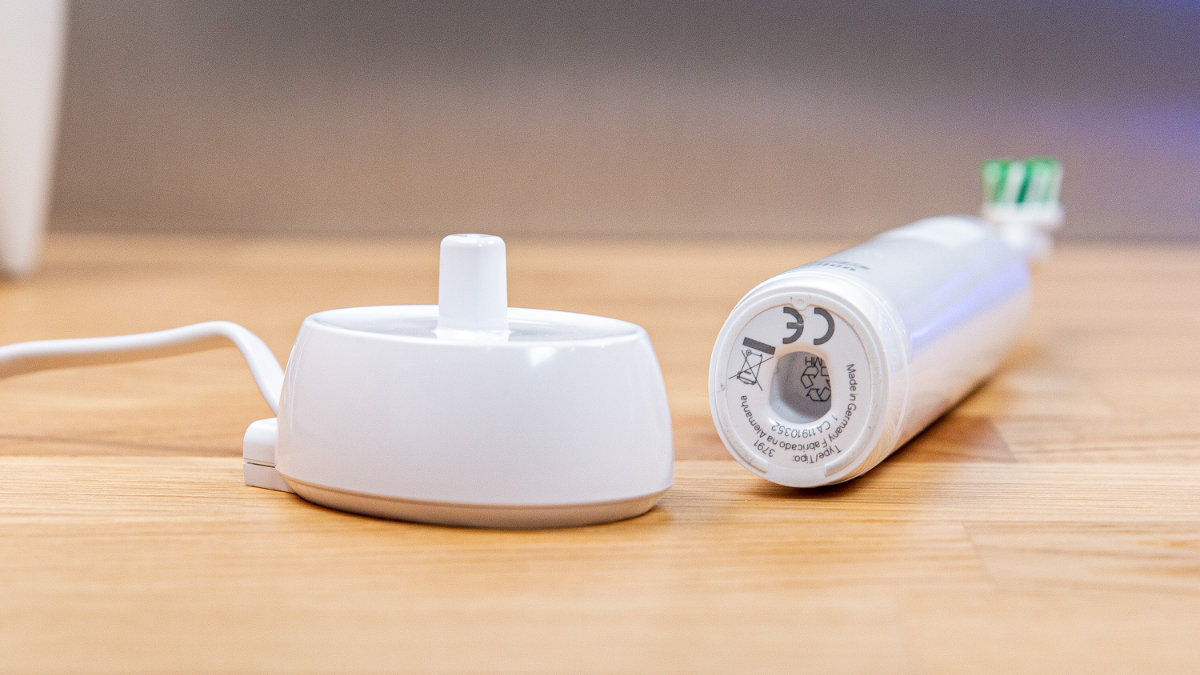
Price & buying advice
The Pro 1000 scores full marks in our pricing category because it's such good value for money. The initial purchase price is cheap and the ongoing cost of brush heads is also cheap, especially compared to Oral-B's iO range.
The Pro 1000 typically sells for its retail price of $50. At select times through the year, it can drop to as little as $40.
Most Oral-B brushes sell for 20% less than their recommended retail price, but the already low price of the 1000 makes this somewhat of an exception.
For $50 you are getting a decent toothbrush and it is far from a bad buy. I wouldn’t recommend paying much more for this brush, though.
The Smart 1500 from Oral-B costs $15-20 more and addresses a couple of the shortcomings of the 1000, most notably the lack of pressure sensor alert.
Oral-B brushes are amongst the most affordable when it comes to ongoing ownership costs.
Replacement brush heads cost around $5 each, so over 3 years you will need to spend about $55 on them. This gives a total ownership cost of $105 for the Pro 1000.
Philips Sonicare’s 2100 Series is similarly featured. It’s cheaper to buy initially, but refills are more expensive and costs about $15 more to own over 3 years.
Oral-B’s Pro 500 is cheaper and is our pick for an Oral-B brush on a budget, but you do get a better cleaning action from the Pro 1000, which I believe is worth paying the extra for when you think about the long term benefits.
| Overall Score |
| How well it cleans |
| How it feels |
| Recommended features |
| Additional items & features |
| Battery performance |
| Price |
| Support & reputation |
| Buying options |
Support & reputation
Oral-B has a longstanding history of toothbrush production and over the years of testing I've found its brushes to last well.
My own hands-on use has confirmed that the Pro 1000 handle is solid and well constructed with limited gaps or weak points. Thus, a long usable life is expected provided that you take care of it.
By the very nature of the product, they are not immune to failure. Two years of manufacturer support is provided as standard. With regular care, I would anticipate 5+ years of service from the Pro 1000. Should it fail after the warranty period , the Pro 1000 is not designed to be repaired at home, unfortunately.
If for whatever reason you aren’t satisfied from the moment you get the brush Braun offers a 60 day money back guarantee.
Environmental impact
The Oral-B Pro 1000 has limited box contents which reduces its weight during transportation compared to others that come with more items. The box could be made a bit smaller, saving space and resources.
Positively, it is all paper based and does not have a polystyrene inner tray like Oral-B has used in the past.
Not being a smart toothbrush, the total number of components used are less, thus fewer resources are used and less waste is created when the brush no longer works.
Unfortunately, it has not been designed to be easily repaired at home. Trying to replace parts like the battery will likely break the brush. This makes it more likely to be discarded rather than repaired if broken.
While Oral-B has partnered with schemes such as TerraCycle, it does not yet have its own recycling scheme for used brush heads or faulty products.
Its brush heads are made from petroleum-based plastic, which uses up the planet’s finite resources compared to using plant-based plastics.
Conclusion: very good value for little compromise
The lack of a visible pressure sensor and the lesser battery life do go against the Pro 1000, especially when you consider that the Smart 1500 does have these features and isn’t that much more expensive.
With that said, the Pro 1000 does have the dentist recommended 2 minute timer and pacer. It cleans the teeth really well and gives you a choice of 3 different cleaning modes.
Given the cleaning results, minimalist design, 2 year warranty and long term value for money, you could do a lot worse.

Video review
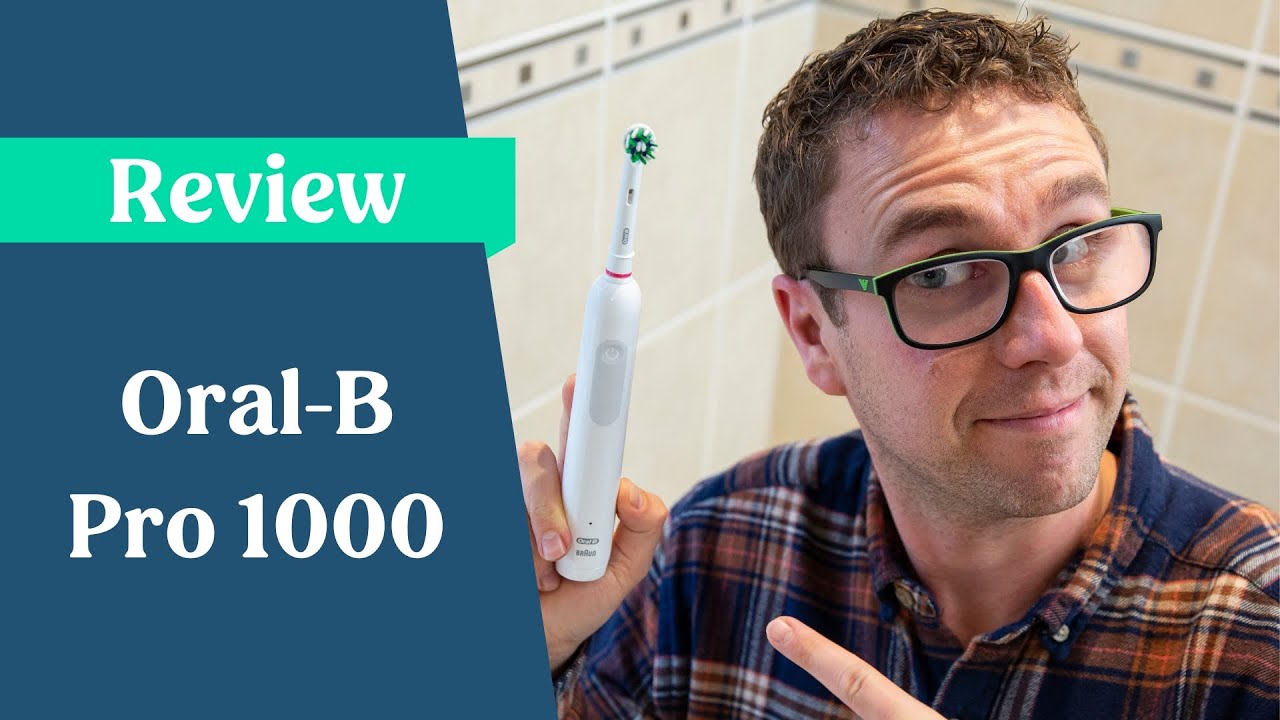
Size guide
- Toothbrush height with head - 23.2cm / 9.1 inches
- Toothbrush height without head - 19.5cm / 7.7 inches
- Width - 2.5cm / 1 inches
- Depth/thickness - 2.9cm / 1.1 inches
- Weight with head - 123g / 4.3oz
- Weight without head - 118g / 4.1oz
- Package weight - 395g / 13.9oz
Noise
- 73dB
Country of manufacture
- Germany (handle & head)






Looks like this is now sold with 3 cleaning modes. How do I know if I am getting the Pro 1000 with one or three cleaning modes?
You would only be able to tell via the product listing or the box I beleive. That is until you have it in hand and can cycle through the modes to confirm they are present.
Never mind I finally got it opened - just like the instructions read :)
I'm not certain as to how to replace the batteries - help!